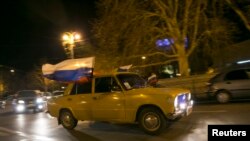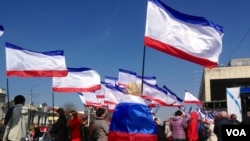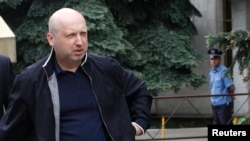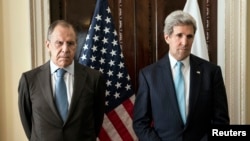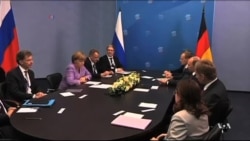UNITED NATIONS —
Russia deployed its veto at the U.N. Security Council Saturday, blocking a resolution condemning the referendum slated for Sunday in the Ukrainian region of Crimea. If passed, it would see the Black Sea peninsula secede from the country and join Russia.
The move came as Ukraine's ambassador to the United Nations warned that Russian paratroopers have crossed the Crimean border into the Ukrainian mainland.
At the U.N, the United States put forward the resolution in a strategic effort to demonstrate the extent of Russia's political isolation, and attempted to reaffirm Ukraine's territorial integrity, sovereignty and independence while calling on states not to recognize the results of the referendum.
Although it was not adopted, the effort succeeded to the extent that China — Moscow's close ally and another veto-wielding council member — abstained instead of siding with Russia.
In remarks to the council, China's envoy urged the quick establishment of an international coordinating mechanism to explore a political settlement. He also said all parties should refrain from actions that would escalate tensions, and suggested that international financial institutions should explore how to maintain Ukraine's economic and financial stability.
Russian aggression 'escalating'
The largely symbolic Security Council maneuvers are unlikely to change Moscow's mind and or deescalate the situation, let alone derail the referendum, which is scheduled for March 16. Russian troops have been amassing both on the Ukrainian-Russian border and inside the autonomous Crimea region, and Ukraine's U.N. Ambassador, Yuriy Sergeyev, told the council that Russia's military aggression is escalating.
“Russian troops entered the mainland of the south from Crimea. Now we are facing new developments and we are to face further dangerous stance of Russian Federation, and I appeal to all of you to find means and measures in the Security Council and United Nations, as well as on bilateral level, to do utmost to stop the aggressor, here present by the Russian delegation,” he said.
He told reporters afterwards that the region the Russian forces, including paratroopers, have entered is responsible for providing electricity and water to the Crimean peninsula.
Reuters reported that about 120 Russian troops had moved into the area but that Ukraine's border guard service said there was no threat of "confrontation."
Russia defends vote
The Russian ambassador, Vitaly Churkin, speaking ahead of the vote, defended the right of self-determination of the Crimean people and appeared to argue that the referendum would correct an earlier Soviet error.
“Up until 1954, Crimea was part of the Russian Federation. It was given to Ukraine in violation of the norms at that time under Soviet law and without taking into account the view of the peoples of Crimea, who nevertheless remained within a single state — the USSR. When the USSR fell, Crimea became part of Ukraine automatically. The view of the people of Crimea — once again — was ignored,” said Churkin.
Council diplomats made forceful condemnations of Moscow's behavior in the past weeks. France's envoy accused Russia of vetoing the U.N. Charter, while Lithuania's ambassador quoted former Russian President Boris Yeltsin's 1997 remarks in Kyiv, where he declared that Russia did not lay claim on Ukraine or any of its cities.
U.S. Ambassador Samantha Power said Russia's veto could not change the fact that its actions would have consequences, nor would it change the aspirations and destiny of the Ukrainian people.
“Nor can it change Crimea’s status. Crimea is part of Ukraine today; it will be part of Ukraine tomorrow; it will be part of Ukraine next week; it will be part of Ukraine unless and until its status is changed in accordance with Ukrainian and international law,” said Power.
If the referendum goes ahead Sunday as expected, Russia is likely to face a barrage of economic sanctions from the United States and European Union which could cost it hundreds of billions of dollars.
Rival rallies
In Moscow Saturday, tens of thousands of protesters gathered for rival rallies on Crimea.
Supporters of the Crimea referendum waved Russian and Soviet Union flags as they marched to Moscow's Revolution Square. Many of them wore identical red and black outfits.
Separately, chanting opponents waved Ukrainian and Russian flags. Some voiced concern that Russian intervention in Crimea could lead to war.
Also, hundreds of people turned out for a rally in Kiev where they voiced support for Crimea remaining a part of Ukraine.
International monitors
International monitors began arriving in Crimea on Saturday to observe Sunday's referendum vote. The monitors were invited by Russia and pro-Russian Crimean officials.
Alexander Simov, a Bulgarian journalist, said he believes the vote is legitimate.
"I am going to watch the whole process. To see ... that it is a legal referendum," he said. "So I think it is going to be very legal."
Another monitor, Helsinki University professor Johan Backman, says Western powers do not fully understand the situation in Crimea.
"Western politicians cannot understand what is going on," he said. "As far as I understand, these countries, and especially the U.S., have very weak informational base about what is going on in Russia ... and, secondly, what is happening in Ukraine. Also, Western politicians of EU they do not really understand what happens in Russia. Western countries are at a dead end. In fact they cannot take any measures against Russia in this situation. And Russia is in control totally and securely."
'Kremlin agents'
Ukraine accused "Kremlin agents'' on Saturday of fomenting deadly violence in Russian-speaking cities and urged people not to rise to provocations its new leaders fear Moscow may use to justify a further invasion after its takeover of Crimea.
From his speaker's chair in parliament, acting president Oleksander Turchinov referred to three deaths in two days in Donetsk and Kharkiv and said there was "a real danger" of invasion by Russian troops across Ukraine's eastern border.
Addressing members of the party of the pro-Moscow president who was ousted in last month's Kiev uprising, Turchinov said: "You know as well as we do who is organizing mass protests in eastern Ukraine — it is Kremlin agents who are organizing and funding them, who are causing people to be murdered."
Two men, described by police as pro-Russian demonstrators, were shot dead in a fight in Kharkiv late on Friday. A Ukrainian nationalist was stabbed to death when pro-Russia and pro-Ukraine demonstrators clashed in Donetsk on Thursday.
Reaction
U.S. Secretary of State John Kerry said Friday that Russian acceptance of a Crimean referendum to break off from Ukraine and join Russia would be an illegal "backdoor annexation."
Kerry met with Russian Foreign Minister Sergei Lavrov for six hours in London Friday in an effort to defuse the tensions in Crimea.
If Sunday's vote passes and the Russian parliament ratifies it, Kerry said that would violate international law, and there will be consequences. He said this is not a threat against Russia but a matter of respecting international standards for annexation and independence.
Lavrov said in a separate news conference that the talks with Kerry were useful, but the two have "no common vision" on Crimea. He said Russia will "respect the will of the Crimean people," and he criticized the threat of U.S. and European Union sanctions on Russia as "counterproductive."
U.S. Republican Senator John McCain says a Russian invasion of eastern Ukraine would be a breach of "enormous consequences" and could bring a very sharp response by the United States and Europe.
Story continues below video: Germany Warns of 'Massive' Consequences
Speaking from Kyiv Saturday as part of a U.S. Senate delegation meeting with Ukraine's interim leaders and the opposition, the senator said he is deeply concerned about reports of Russian troops moving closer to the eastern Ukrainian border and conducting military exercises.
Calling Sunday's referendum in Crimea "phony," McCain said if Russia invades Ukraine, the United States and its European allies would contemplate action that they have never thought about before in their relations with Russia.
U.S. President Barack Obama said Friday he still hopes for a diplomatic solution to the crisis. But Kerry said it is clear Russian President Vladimir Putin will not make any moves until after Sunday's referendum.
The Kremlin says Putin told U.N. Secretary-General Ban Ki-moon in a phone call that the referendum is "fully consistent with international law and the U.N. Charter." However, the U.S. and European Union say the referendum violates Ukraine's constitution and international law.
U.S. Vice President Joe Biden is traveling to Poland and Lithuania next week to meet with regional partners to discuss events in Ukraine.
A White House statement says Biden will consult on steps to support Ukraine's sovereignty, and affirm international "collective defense commitments under the North Atlantic Treaty."
Some information for this report provided by AP, AFP and Reuters.
The move came as Ukraine's ambassador to the United Nations warned that Russian paratroopers have crossed the Crimean border into the Ukrainian mainland.
At the U.N, the United States put forward the resolution in a strategic effort to demonstrate the extent of Russia's political isolation, and attempted to reaffirm Ukraine's territorial integrity, sovereignty and independence while calling on states not to recognize the results of the referendum.
Although it was not adopted, the effort succeeded to the extent that China — Moscow's close ally and another veto-wielding council member — abstained instead of siding with Russia.
In remarks to the council, China's envoy urged the quick establishment of an international coordinating mechanism to explore a political settlement. He also said all parties should refrain from actions that would escalate tensions, and suggested that international financial institutions should explore how to maintain Ukraine's economic and financial stability.
Russian aggression 'escalating'
The largely symbolic Security Council maneuvers are unlikely to change Moscow's mind and or deescalate the situation, let alone derail the referendum, which is scheduled for March 16. Russian troops have been amassing both on the Ukrainian-Russian border and inside the autonomous Crimea region, and Ukraine's U.N. Ambassador, Yuriy Sergeyev, told the council that Russia's military aggression is escalating.
“Russian troops entered the mainland of the south from Crimea. Now we are facing new developments and we are to face further dangerous stance of Russian Federation, and I appeal to all of you to find means and measures in the Security Council and United Nations, as well as on bilateral level, to do utmost to stop the aggressor, here present by the Russian delegation,” he said.
He told reporters afterwards that the region the Russian forces, including paratroopers, have entered is responsible for providing electricity and water to the Crimean peninsula.
Reuters reported that about 120 Russian troops had moved into the area but that Ukraine's border guard service said there was no threat of "confrontation."
Russia defends vote
The Russian ambassador, Vitaly Churkin, speaking ahead of the vote, defended the right of self-determination of the Crimean people and appeared to argue that the referendum would correct an earlier Soviet error.
“Up until 1954, Crimea was part of the Russian Federation. It was given to Ukraine in violation of the norms at that time under Soviet law and without taking into account the view of the peoples of Crimea, who nevertheless remained within a single state — the USSR. When the USSR fell, Crimea became part of Ukraine automatically. The view of the people of Crimea — once again — was ignored,” said Churkin.
Council diplomats made forceful condemnations of Moscow's behavior in the past weeks. France's envoy accused Russia of vetoing the U.N. Charter, while Lithuania's ambassador quoted former Russian President Boris Yeltsin's 1997 remarks in Kyiv, where he declared that Russia did not lay claim on Ukraine or any of its cities.
U.S. Ambassador Samantha Power said Russia's veto could not change the fact that its actions would have consequences, nor would it change the aspirations and destiny of the Ukrainian people.
“Nor can it change Crimea’s status. Crimea is part of Ukraine today; it will be part of Ukraine tomorrow; it will be part of Ukraine next week; it will be part of Ukraine unless and until its status is changed in accordance with Ukrainian and international law,” said Power.
If the referendum goes ahead Sunday as expected, Russia is likely to face a barrage of economic sanctions from the United States and European Union which could cost it hundreds of billions of dollars.
Rival rallies
In Moscow Saturday, tens of thousands of protesters gathered for rival rallies on Crimea.
Supporters of the Crimea referendum waved Russian and Soviet Union flags as they marched to Moscow's Revolution Square. Many of them wore identical red and black outfits.
Separately, chanting opponents waved Ukrainian and Russian flags. Some voiced concern that Russian intervention in Crimea could lead to war.
Also, hundreds of people turned out for a rally in Kiev where they voiced support for Crimea remaining a part of Ukraine.
International monitors
International monitors began arriving in Crimea on Saturday to observe Sunday's referendum vote. The monitors were invited by Russia and pro-Russian Crimean officials.
Alexander Simov, a Bulgarian journalist, said he believes the vote is legitimate.
"I am going to watch the whole process. To see ... that it is a legal referendum," he said. "So I think it is going to be very legal."
Another monitor, Helsinki University professor Johan Backman, says Western powers do not fully understand the situation in Crimea.
"Western politicians cannot understand what is going on," he said. "As far as I understand, these countries, and especially the U.S., have very weak informational base about what is going on in Russia ... and, secondly, what is happening in Ukraine. Also, Western politicians of EU they do not really understand what happens in Russia. Western countries are at a dead end. In fact they cannot take any measures against Russia in this situation. And Russia is in control totally and securely."
'Kremlin agents'
Ukraine accused "Kremlin agents'' on Saturday of fomenting deadly violence in Russian-speaking cities and urged people not to rise to provocations its new leaders fear Moscow may use to justify a further invasion after its takeover of Crimea.
From his speaker's chair in parliament, acting president Oleksander Turchinov referred to three deaths in two days in Donetsk and Kharkiv and said there was "a real danger" of invasion by Russian troops across Ukraine's eastern border.
Addressing members of the party of the pro-Moscow president who was ousted in last month's Kiev uprising, Turchinov said: "You know as well as we do who is organizing mass protests in eastern Ukraine — it is Kremlin agents who are organizing and funding them, who are causing people to be murdered."
Two men, described by police as pro-Russian demonstrators, were shot dead in a fight in Kharkiv late on Friday. A Ukrainian nationalist was stabbed to death when pro-Russia and pro-Ukraine demonstrators clashed in Donetsk on Thursday.
Reaction
U.S. Secretary of State John Kerry said Friday that Russian acceptance of a Crimean referendum to break off from Ukraine and join Russia would be an illegal "backdoor annexation."
Kerry met with Russian Foreign Minister Sergei Lavrov for six hours in London Friday in an effort to defuse the tensions in Crimea.
If Sunday's vote passes and the Russian parliament ratifies it, Kerry said that would violate international law, and there will be consequences. He said this is not a threat against Russia but a matter of respecting international standards for annexation and independence.
Lavrov said in a separate news conference that the talks with Kerry were useful, but the two have "no common vision" on Crimea. He said Russia will "respect the will of the Crimean people," and he criticized the threat of U.S. and European Union sanctions on Russia as "counterproductive."
U.S. Republican Senator John McCain says a Russian invasion of eastern Ukraine would be a breach of "enormous consequences" and could bring a very sharp response by the United States and Europe.
Story continues below video: Germany Warns of 'Massive' Consequences
Speaking from Kyiv Saturday as part of a U.S. Senate delegation meeting with Ukraine's interim leaders and the opposition, the senator said he is deeply concerned about reports of Russian troops moving closer to the eastern Ukrainian border and conducting military exercises.
Calling Sunday's referendum in Crimea "phony," McCain said if Russia invades Ukraine, the United States and its European allies would contemplate action that they have never thought about before in their relations with Russia.
U.S. President Barack Obama said Friday he still hopes for a diplomatic solution to the crisis. But Kerry said it is clear Russian President Vladimir Putin will not make any moves until after Sunday's referendum.
The Kremlin says Putin told U.N. Secretary-General Ban Ki-moon in a phone call that the referendum is "fully consistent with international law and the U.N. Charter." However, the U.S. and European Union say the referendum violates Ukraine's constitution and international law.
U.S. Vice President Joe Biden is traveling to Poland and Lithuania next week to meet with regional partners to discuss events in Ukraine.
A White House statement says Biden will consult on steps to support Ukraine's sovereignty, and affirm international "collective defense commitments under the North Atlantic Treaty."
Some information for this report provided by AP, AFP and Reuters.





